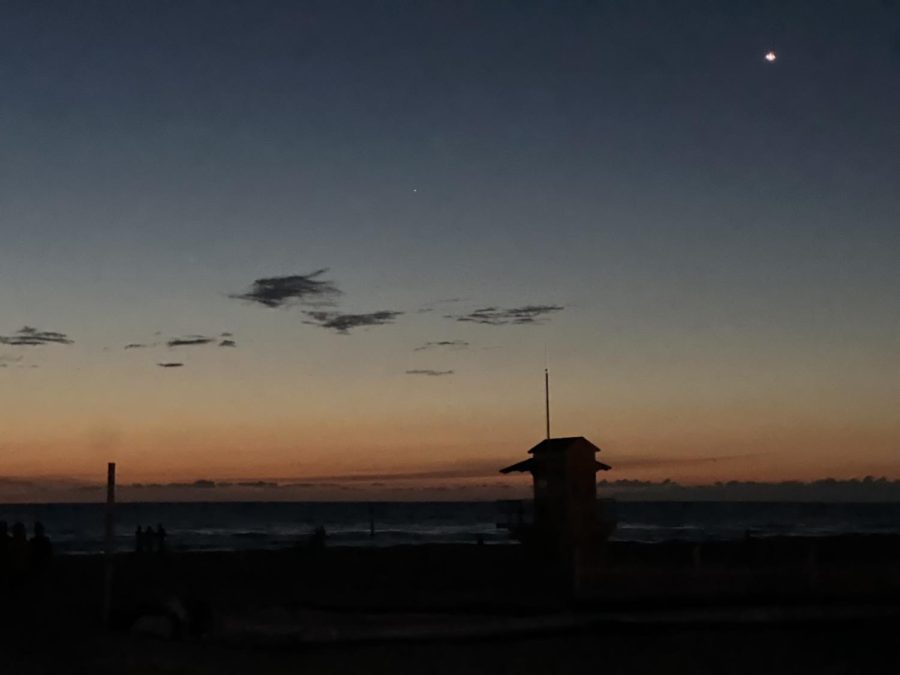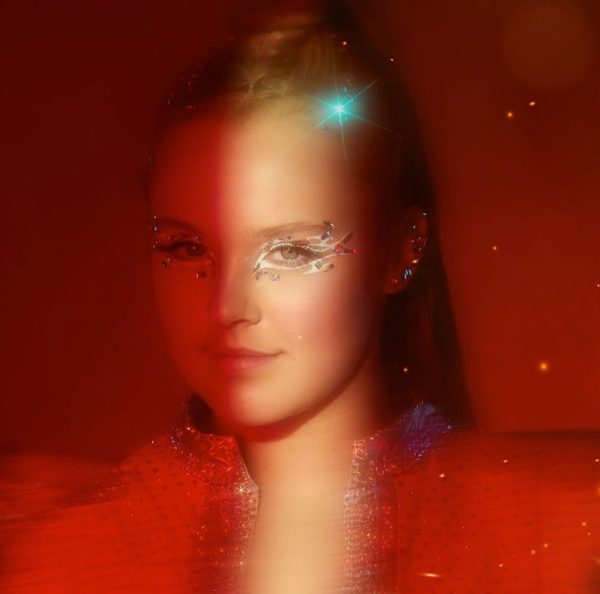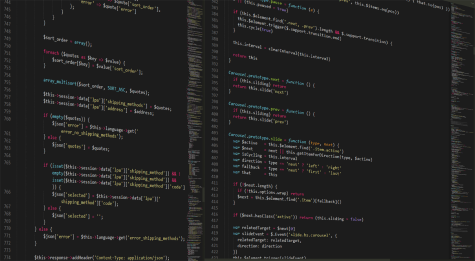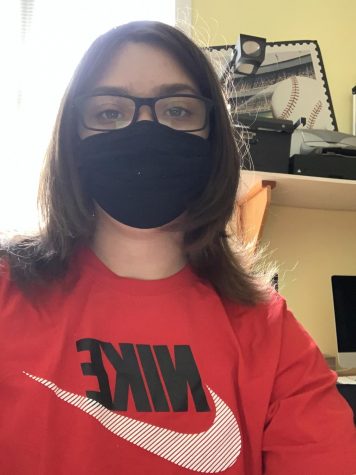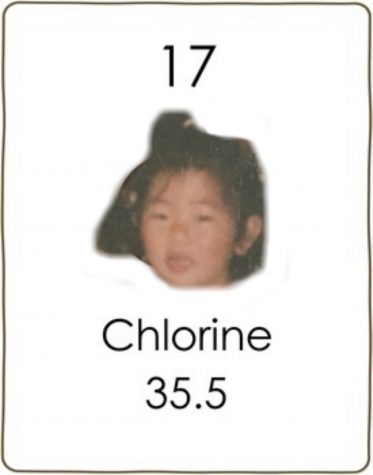From the Dusks of Senior Year
Everyone, whether they are aware of it or not, has an inner world that yields the self at its most intimate. I like to envision mine as a shadowed, eternal sea with tides in constant flux, and come dusk—the hours when reality begins to bruise, filling the body with a deep blue afterache—they wash to the soul’s shores all the fragments of feeling and truth from my depths.
Throughout senior year, I spent many hours dyed in these dusks, collecting my own fragments in the form of poems, prose, and reflections. And I’d like to use this space here to hold some of them.
I. Poem (excerpt)
Written in January:
when I was trying to map out the evolution of what art meant, or began to mean to me
little bodies of light speckling an endless dark field
while a single wing, soft and unbending, paints it
white with a perfect stroke. a brush bleeding gold, then
violet, then maroon: a river of fallen hymns
a graveyard of murdered friends, a letter unblooming in burial ink,
a kid holding a sparrow who fell from the sky one twilight
evening: its feathers half-doused in death, its heart half-beating
like me, kid thinks, and warms it. tucks it into their chest,
but never saves it. for beauty? you ask. no, not for beauty,
kid answers, for the sake of having something that belongs to me.
II. Song (and a little of a love letter)
Dirty old river, must you keep rolling
Flowing into the night?
Oh, “Waterloo Sunset,” the quintessential lovesong for London, which has been lethally addicting to me this past year for I am terribly lovesick for London. I’ve injected my bloodstream with this song, and its variants—the stereo version, Glastonbury 2010 version, The Jam cover, David Bowie cover, David Bowie and Ray Davies live version, Damon Albarn and Ray Davies live version—relentlessly, and I am yet to grow sick of it (spoiler: I really never will). As stated already, I am so enamored with this song because I am so enamored with London, and even the mere thought of the city makes my heart swell to twice its size. It is swelling, actually, as I write this.
I’m moving there for university in a matter of months, and I’ve never in my life felt so certain of a decision. I can’t explain it really, but it feels like there’s already a fragment of myself there, waiting for me to grow into it, like—pardon the cliché—like it was meant for me. Because London is the bearer of everything I love, everything that harmonizes with me. Centuries of history and stories and humanity swimming in every street…a plethora of idyllic parks, gardens, and squares that allow you to step in and simply breathe…the vibrant and easily accessible cultural scene (world-class museums and art galleries are free)!
And how it has birthed some of my favorite acts of music—Cream, Bowie, Siouxsie and the Banshees, The Libertines, Suede, Placebo, Queen, just to name a few. And there is, of course, all the writers who found in London both a home and source of illumination…Keats, Plath, Ishiguro, Wilde, Dickens, Eliot, and Woolf, oh, Woolf! A tiny portion of the reason why I ultimately chose King’s College London was because she, as well as Keats, was educated there, and to be connected in some way to such luminaries and the waves they cast, stirs me tenderly.
III. Insight (cloaked in a poem)
Written sometime in March:
When you learn to love and give power to the mundane,
you will find that its sweetness alone is enough to live for
A little child who grew up in concrete
hid all their love notes inside their sleeve.
But when the sun set after the rain and
a burst of spring rippled through the gray sky
they’d whisper to the streams veining the road corners
and watch as they catch tiny halos of day bleeding away.
Below a flowering dogwood tree, the child crouches down
and tells the stream, if I die tomorrow
I would not mind
because today it rained so gently
and I got to breathe you. And now you run
through me softly and hum in my body:
the Earth forgives,
the nightingales
curl up inside a cypress
and go to sleep
instead of singing light
into the night.
Today the child understands
they do not need to be
anything but a friend
in the rainy day’s company.
IV. Prose (unfinished)
Written in February,
when I was in a limbo in regards to processing my pain, caught between wallowing and invalidating
This is how pain pulsates.
Before a mother who can’t stand to hold her own baby. Yet she can’t part from it.
(Because she fears feeling alone and small and husked.
Because she needs to be something–even if a failed mother.
Because after it all, the wounds lining her stomach can’t be for nothing. Anything except a waste.)
So every night they sleep under the same sliver of moon spilling through oaken frames, only the baby is exiled to the darkest corner of the room, as far away from the mother’s bed where light cannot wrangle it.
But baby weeps, howls, and startles the night, and mother is arrested by its cries. Mother is detained in a state of yearning, yearning—but never daring—to reach and bring it home into her arms. Lock eyes until they become air and wipe its tears away gently, in the touch a promise: you’re my own and all my ugliness and my warmth.
Mother knows all she has to do is hold it.
Doesn’t need to clean the blood. Doesn’t need to cure the ache.
Just hold it, mother.
Just hold me, mother.
And the rest was meant to transition to the baby, or my “pain’s” voice. I’m not sure I’ll ever finish this, but I’ve since learned how to hold it.
V. Insight: Embrace mourning
Moments are music,
and I can never hear
the song,
only the end
The beginning of a poem I wrote in December and thought too…cringe to finish, both in style and concept (I am critical to my own detriment). Regardless, see, I always find myself mourning things long before they end, stealing light from the moment and feeling guilty for it. But I’ve made some developments lately.
What’s that one quote you’ve seen countlessly in Instagram captions, “don’t cry because it’s over, smile because it happened”? This thought bubbled up for a second, when earlier I was stewing in sadness over leaving Village and having to bury this very warm corner of my life that has been cradling me.
But I popped that thought the very next second, because I think you should absolutely sob when good things come to the end! If you think about it, mourning is the other half of celebration, as much—if not more—as smiling is. When we “smile,” we simply look at it on its surface, draw from it a select few feelings or memories it brought to us, and hear, faintly, its heartbeat underneath. But when we mourn, we are inside the heartbeat itself; we are beating with it. The weight is held, and carried.
And this is not just the celebration of whatever “it” is that has just ended, but also a celebration of being human. Because, look, isn’t our ability to feel deeply a gift? What a waste it would be, to deny ourselves of our natures, and hesitate to hold life in all its colors, let it seep.
So weep, please, but don’t let it drown the rest of your life. Simply reserve a space for it.
VI. Prose (excerpt)
Written some Saturday in April when spring was at its ripest:
I took a bus to Glen Cove and sat before the sea to subvert what this season was meant for
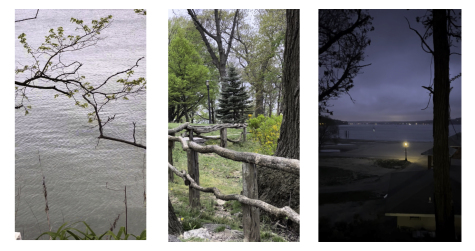
On a hill over the sea, under the canopy of yearning trees, you sink into a weathered bench and let blueness reflect in your eyes infinitely. The hum of an ice cream truck hangs low in the distance, and you note it’s spring, because the ice cream men, just like red-winged blackbirds, only return when the air is balmy and daffodils are drowning the dirt. It’s spring, and is it melodramatic to say you feel like a pale leaf curling into itself among endless harlequin petals, never finding the voice to sing out in golds and scarlets before death, and now you’re left phantomed on the other side?
Healing, you’re still a stranger to the word. Healing, you kneel in its long-limbed shadow, unsure whether to pray or go to sleep, afraid this will be another god whose altar you abandon because the gold loses its glimmer. Healing, another language your tongue can wear but you can never grow as skin.
A family of sparrows float home across the water. A squirrel digs for dinner under the old sycamore. A little girl giggles as the sky darkens and the first lantern turns candescent. And the waves in the sea, still they grieve, still they stir in you that sorry sinking feeling.
VII. Poem (unfinished)
Sun-haunted waltz, written recently:
whenever I am in contact with happiness, I hear two voices dueling in my head: one small and guilty, telling me I am undeserving; the other luminous and conquering, telling me to shut up and seize it.
Under the tomb of June, the air of a sun-haunted ballroom
entangles two voices in a waltz, fighting their way home to a throat
One corpse-gray with its lonely heart in clots, shrinks into itself in the other’s arms
and pleads the shadow symphony–to play songs from the wreckage, homely pangs
of drowning dawns and self pity, slaughter the summer ever so softly
(I am too ill to lift your light without falling)
The other wider and suffused in fireflies’ glow, envelops the smaller in radical gentleness
and beckons the soldiers hanging from the ceiling–to burn the flags from the old regime,
turn ashes into roaring rain, enter through the eye of the storm,
a stream of heaven cascades
(I have wrestled with the light and wear its blood on my head)
And the rest is to continue in dialogue with each other, culminating in…I’m not sure.
VIII. Insight: You can be incomplete and still claim yourself
I have noticed, in the collective consciousness of our society, that happiness is almost always positioned behind bars: before freeing it, our hands must be clean, conditions must be met. If we touch it before they are, we will soil and slaughter it. With the knowledge that we are “dirty” in the before stage, it is only natural we may hide from the self—and, based on those conditions, conjure in our mind a “clean,” whole vision of it that may never exist. And we think we are chasing this vision, when we are really chained by it.
We live solely for the reconciliation of our broken self and the whole self, and in this process we either end up losing ourselves, forgetting ourselves, or have nothing left to give ourselves.
So I say, for a moment at least, lay all your dirtiness, your broken pieces, your wreckage before you, and sit inside it. Not as an act of celebrating, more of honoring them as part of your landscape. Everything that has made you and will stay with you as long as you live. Because nothing ever dies, a quote from Toni Morrison’s Beloved. And while they stay, you can choose to forgive them.
Look: I have written these words—most echoing of incompleteness, most pieces in themselves unfinished—and now look at them without regret, nor repulse. I do not yet love them, but I can say I am fearless before them, and that I have been able to forgive all the broken selves who bled them. And this bravery, I will call it that—the act of simply releasing your breath in front of yourself and recognizing it is yours—is a necessary step before you ascend to self-celebration. Do not skip this step. Stay here, for as long as you need. I’m still here.

